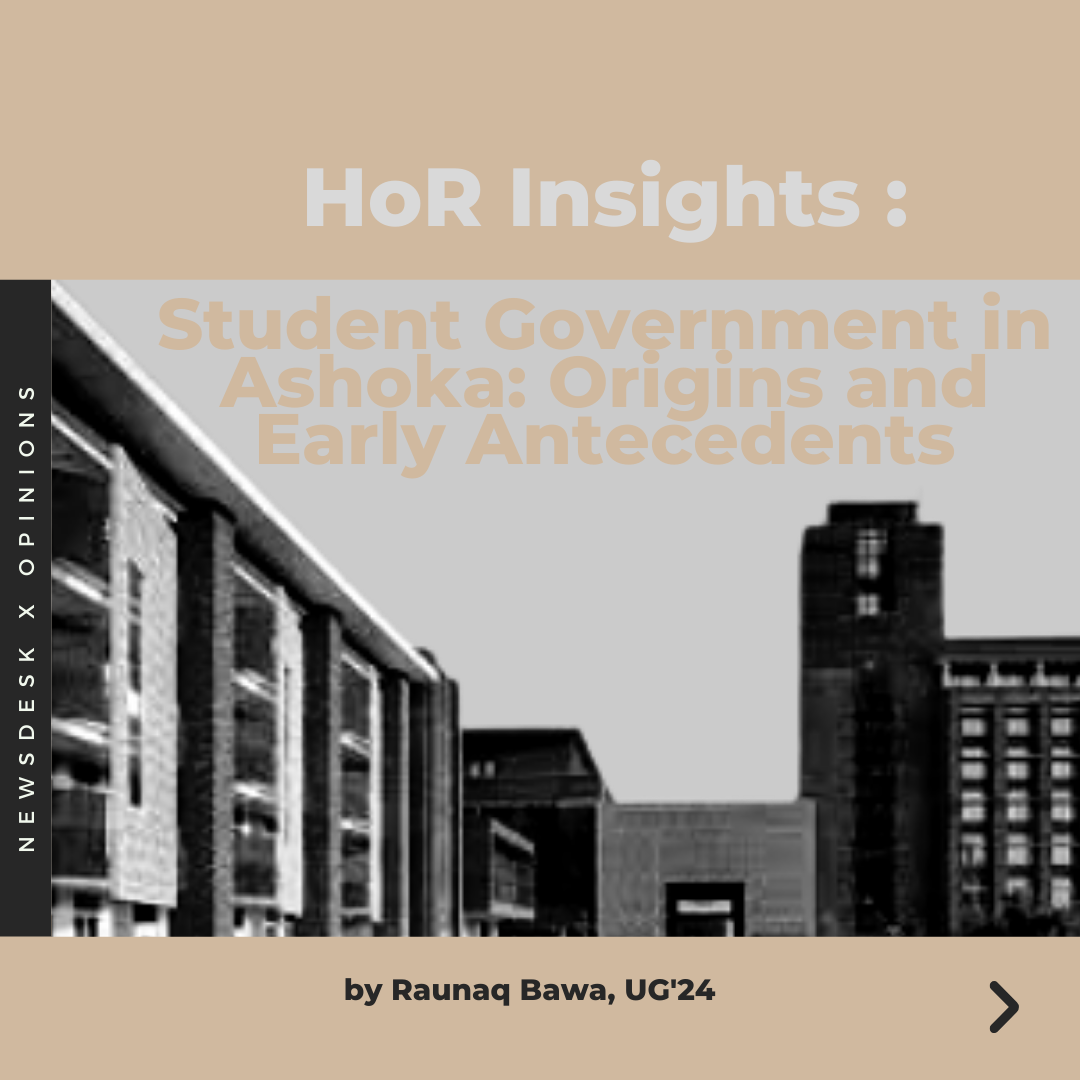
Student Government in Ashoka: Origins and Early Antecedents
Part 2: Struggles and the Third House
- by Raunaq Bawa, UG’24
This is the concluding instalment on our two-part take on the origin of Ashoka University’s Student Government and House of Representatives. This was written in conversation with Sanat Sogani (the second President of the AU House of Representatives) and KC Sachin (third President of the House). It sheds light on the way the SG’s relationship with the University Administration progressed through various events, and further discusses the relevance of student politics at Ashoka and the advent of the Third House.
The Student Government’s second year also saw an evolution in its relationship with the administration. Sachin explained how, during the founding of the institution, the administration apparently pictured the SG as being a group of handpicked students who would essentially be subservient to the administration, and would act as executors of the administration’s vision for the University. Consequently, in the first two Houses, there was a significant pushback by the student representatives, who demanded to be executors of the students’ vision for the University. Sachin described a significant deterioration of ties between the administration and the SG especially during the tenure of the second House. This was primarily attributable to two major factors—firstly, the induction of new members in the administration, who were not as supportive of the SG endeavour as their predecessors, and secondly, the controversy around the Kashmir Petition.
The controversial Kashmir Petition incident put the nascent-stage Ashoka University along with the SG in the national limelight. As violence grew in the erstwhile state of Jammu and Kashmir in 2016, a group of YIFs publicised the ‘Kashmir Petition’, which, according to The Indian Express, “condemned the violence…and called for a plebiscite in Jammu and Kashmir.” While the SG did not itself issue the petition, one of its members signed it. In the fallout of this petition, the University’s governing body issued a formal condemnation of the “mis[representation] of Ashoka University in the public domain,” Further, three members of the administration along with a professor—Dr Rajendra Narayanan—the only staff and faculty to have signed the petition, resigned shortly after the incident. This led to the SG demanding clarifications from the governing body with respect to its decisions, and it also organised a vigil Dr. Narayanan’s resignation.
While this was a low point in administration-SG relations, Sanat also illustrated the valuable support some elements of the administration extended to the SG during his tenure. Notably, Ms. Rashmi Singh, then-Director of Student Life, was particularly supportive of the SG’s efforts.
Significant shortfalls of the Second House, as well as subsequent Houses, was over the issue of sexual harassment at the University. While the tenure of the Second House saw the establishment of CASH (Committee Against Sexual Harassment), student involvement in the institution was lacklustre, and there was a marked lack of interest. The administration’s efforts—spearheaded by Ms. Rashmi Singh—to conduct sensitisation workshops, were also met with a lack of significant student participation. No significant improvements were noted in the Third House.
With the advent of the Third House, KC Sachin was elected as the new President. His tenure saw a further entrenchment of the SG in the University’s campus culture. Most notable was the rise in stature of the Ministry of Culture. While in the past, most cultural events were organised by the Office of Student Life, now, this responsibility was transferred to the Culture Minister, who would now have greater involvement in these. This led to a transition from “administration led cultural events to truly student led cultural events”. The Third House sought to drastically increase the number of student events, which would now be spearheaded by the Sports Ministry in tandem with clubs and societies. The Ashoka Premier League and Agneepath (the sports fest) were newly established in this tenure. Banjara (Ashoka University’s cultural fest) saw a revival. Earlier, Banjara was organised by students chosen by the administration, but now the SG lobbied for a greater say in choosing the primary organisers of the fest. This change made it truly inclusive of student interests with greater scope for student engagement. All these measures were immensely useful in making the SG more relevant in the campus life of the University.
The Third House saw another major achievement — the administration’s decision to grant the SG with its own ‘discretionary budget’. This budget was finalised towards the end of the Third House’s tenure, and made available from the Fourth House onwards, with an initial amount of around seventy thousand rupees. The idea of having such a budget was to give the SG a free hand in taking its own decisions and freeing it from being financially dependent on the administration. This further made the SG a more legitimate body in terms of representing student interests.
The SG is by no means a perfect body, and student politics in Ashoka are far from the ideal. However, one may be realistic in believing that for every degradation, a revival is possible, and perhaps even inevitable. The institution of the SG has promoted free and fair democratic competition in Ashokan student politics, and despite its ups and downs, has become an invaluable component of the Ashokan campus life. For all its shortcomings, having a representative institution to stand up to an often callous administration and to make the students’ voice heard, is comforting. Be it in the Pratap Bhanu Mehta protests for academic freedom, or for making campus a more humane space by standing up for workers’ rights, the SG has served an invaluable function for Ashoka University. One may realistically hope for a rapid revitalisation of Ashokan student politics, and that the recent past has been nothing more than an unfortunate aberration.
